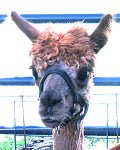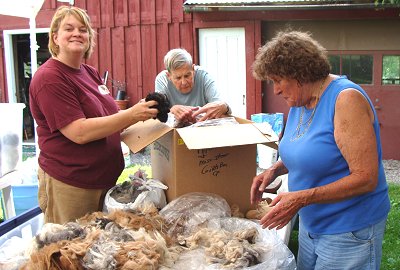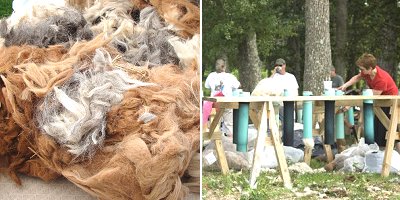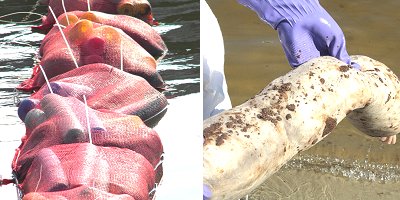- By Dan Veaner
- Around Town
 Print
Print  Alpaca farmers categorize the wool according to how long the fiber is and how consistent the fiber is. The best pieces are 1s and 2s. Those are the ones farmers process for yarn and other uses. The number 3 fiber is shorter and less useful, and tends to pile up. When the Engels and Hunters of Lansing's Angel Tree Farm heard that a non profit called 'A Matter of Trust' was asking for hair to help absorb the oil spill in the Gulf of Mexico, they knew what to do with their large pile of number 3.
Alpaca farmers categorize the wool according to how long the fiber is and how consistent the fiber is. The best pieces are 1s and 2s. Those are the ones farmers process for yarn and other uses. The number 3 fiber is shorter and less useful, and tends to pile up. When the Engels and Hunters of Lansing's Angel Tree Farm heard that a non profit called 'A Matter of Trust' was asking for hair to help absorb the oil spill in the Gulf of Mexico, they knew what to do with their large pile of number 3."They are accepting donations of fiber as well as pantyhose," says Carol Engels, who is also a Lansing Kindergarten teacher. "I put out a flyer at the elementary school. R.C. Buckley Elementary is collection panty hose for us. We're assembling the fiber, sorting it and packaging it. The elementary school will give us panty hose to send with it in the boxes."

(Left to right)Carol Engels, Mal and Ellie Hunter sorting alpaca fiber
to send to the Gulf Coast
Hair naturally collects oil. That's the main reason there is such a large shampoo industry. In the Gulf hair donated by individuals, hair salons, and wool farmers is stuffed into pantyhose, which is then crafted into booms that contain and absorb the oil.
"You use 3" in diameter PVC pipe, put it through a 2x12, and make a chute," says Ellie Hunter. "They put the pantyhose on the bottom and stuff this fiber down into it. They end up with eight or ten foot long booms of fiber that are linked together like a link of hotdogs. It's laid out to trap and absorb the oil."

Fibers from Angel Tree Farm (left) will be stuffed into nylon pantyhose
by volunteers (right - photo courtesy of MatterOfTrust.org )
'A Matter of Trust' has volunteers who work on simple devices that facilitate stuffing the hair into the panty hose. For the safety of those volunteers the organization asks farmers to clear the fiber of twigs, grain, or other substances that could hurt volunteers or make the booms less absorbent. The number 3 fiber and short ends at Angel Tree Farm has been sheared from 35 to 40 alpaca and llamas since they started their herd five years ago.
"It is an accumulation from the last five years, the stuff you just don't quite get to," Carol says. "The number 1 and good quality number 2 is used to make yarn for our shop and roving. That is pretty readily prepared to go to the mill. This takes more time."

Booms are fashioned out of pantyhose stuffed with human and
animal hair. The bags of boom are zip tied together and strung
pier to pier. To make sure flotation isn't an issue donated
pool noodles are cut up and added on top of the shrimp bags
holding the boom. The nylons hold the tiny fibers and both the nylons
and shrimp bags let oil and water in and out.
(photos courtesy of MatterOfTrust.org )
Jay Engels notes that this effort is being undertaken by people who live in gulf states, trying to save their home environment. He says that at one point there was talk of BP paying for materials, but the company is not supporting this effort.
"The worst of it is that BP is not using this any more," says Ellie. "The locals are doing it with their communities. They're making these booms to protect their marshes."
The Engels say that sending the fiber will help clean out their barn as well as doing good in the Gulf Coast. With boxes donated by Bekins they plan to ship the fibers and pantyhose this weekend.
"We're just dong what we can," says Carol. "We'll see what happens."
----
v6i24



